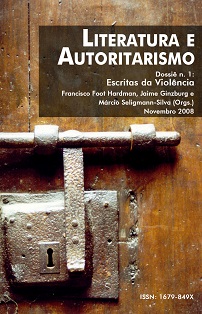Escrita, memória e alteridade em Las genealogías, de Margo Glantz
DOI:
https://doi.org/10.5902/1679849X74593Keywords:
Memory, Otherness, Las genealogías, Margo GlantzAbstract
The article analyses the book Las genealogías, from Mexican writer Margo Glantz in the sphere of a research about contemporary travel narratives. The research has some questions as a starting point: how is memory constructed through writing? How is the memory of a generation constructed? How to write from the experience of others? The narratives in question are hybrid texts, that cross the boundaries of gender, placed between diary, fiction and essay, and open new spaces for memory. In the specific case of Las genealogías, I examine the ways of exploring the limits of family testimony, when the story narrated doesn’t belong entirely to the one that writes, observing the effort to construct a bond between generations and, most of all, to create a common ground between them.
Downloads
References
CORTÁZAR, Julio. Diario de Andrés Fava. Buenos Aires: Alfaguara, 1995.
DIELEKE, Edgardo; BRAVO, Álvaro. Documentales argentinos y brasileños: un mapa en fragmentos. Grumo 6.1. Rio de Janeiro: 7Letras, 2007.
GARRAMUÑO, Florencia. Modernidades primitivas: tango, samba y nación. Buenos Aires: Fondo de Cultura Económica, 2007.
GASPARINI, Pablo. El exílio procaz: Gombrowicz por la Argentina. Rosário: Beatriz Viterbo, 2007.
GLANTZ, Margo. Las genealogias. Ciudad de México: Alfaguara, 1998.
MERCADO, Tununa. Narrar después. Rosário: Beatriz Viterbo, 2003.
SARLO, Beatriz. Tiempo pasado: Cultura de la memoria y giro subjetivo. Una discusión. Buenos Aires: Siglo Veintiuno Editores, 2005.
Downloads
Published
How to Cite
Issue
Section
License
DECLARAÇÃO DE ORIGINALIDADE E EXCLUSIVIDADE E CESSÃO DE DIREITOS AUTORAIS
Declaro que o presente artigo é original e não foi submetido à publicação em qualquer outro periódico nacional ou internacional, quer seja em parte ou na íntegra. Declaro, ainda, que após publicado pela Literatura e Autoritarismo, ele jamais será submetido a outro periódico. Também tenho ciência que a submissão dos originais à Literatura e Autoritarismo implica transferência dos direitos autorais da publicação digital. A não observância desse compromisso submeterá o infrator a sanções e penas previstas na Lei de Proteção de Direitos Autorais (nº 9610, de 19/02/98).






